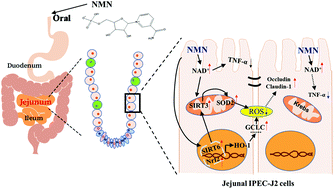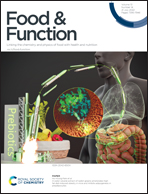Nicotinamide mononucleotide supplementation protects the intestinal function in aging mice and d-galactose induced senescent cells†
Abstract
The nicotinamide adenine dinucleotide (NAD+) level shows a temporal decrease during the aging process, which has been deemed as an aging hallmark. Nicotinamide mononucleotide (NMN), a key NAD+ precursor, shows the potential to retard the age-associated functional decline in organs. In the current study, to explore whether NMN has an impact on the intestine during the aging process, the effects of NMN supplementation on the intestinal morphology, microbiota, and NAD+ content, as well as its anti-inflammatory, anti-oxidative and barrier functions were investigated in aging mice and D-galactose (D-gal) induced senescent IPEC-J2 cells. The results showed that 4 months of NMN administration had little impact on the colonic microbiota and NAD+ content in aging mice, while it significantly increased the jejunal NAD+ content and improved the jejunal structure including increasing the villus length and shortening the crypt. Moreover, NMN supplementation significantly up-regulated the mRNA expression of SIRT3, SIRT6, nuclear factor E2-related factor 2 (Nrf2), heme oxygenase-1 (HO-1), the catalytic subunit of glutamate-cysteine ligase (GCLC), superoxide dismutase 2 (SOD2), occludin, and claudin-1, but down-regulated the mRNA expression of tumor necrosis factor alpha (TNF-α). Specifically, in the D-gal induced senescent IPEC-J2 cells, 500 μM NMN restored the increased mRNA expression of interleukin 6 (IL6ST), IL-1A, nuclear factor (NF-κB1), and claudin-1 to normal levels to some extent. Furthermore, NMN treatment significantly affected the mRNA expression of antioxidant enzymes including NQO1, GCLC, SOD 2 and 3, and GSH-PX1, 3 and 4. In addition, 200 μM NMN enhanced the cell viability and total antioxidant capacity and lowered the reactive oxygen species level of senescent IPEC-J2 cells. Notably, NMN restored the down-regulated protein expression of occludin and claudin-1 induced by D-gal. The above data demonstrated the potential of NMN in ameliorating the structural and functional decline in the intestine during aging.



 Please wait while we load your content...
Please wait while we load your content...